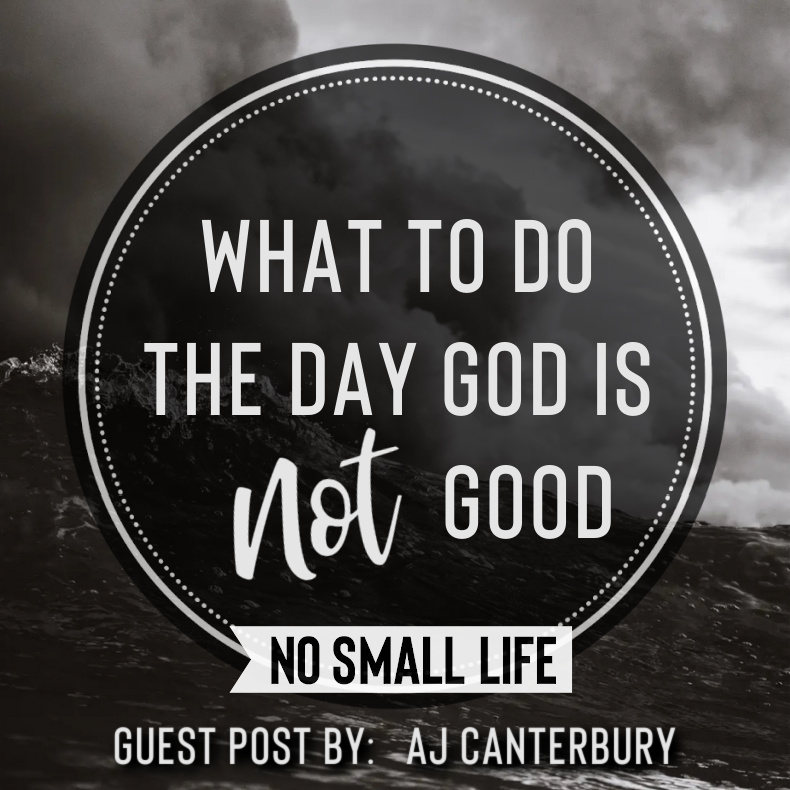“What to Do the Day God Is Not Good”
4 min read by Guest Blogger, AJ Canterbury
“Life is hard; God is good.”
It was the mantra that summed up the last decade of my walk with Jesus. I looked out over the gymnasium filled with church members and people from the community, as I rehearsed my testimony from the youth/green room.
My church hosted a family night as a means of community outreach. The people were here to be entertained by an illusionist, not to see me. I was the intermission filler, asked to share the trust I had in Jesus with the audience. I was meant to offer any unbelievers a glimpse of something real in contrast to the tricks of the eye they had just witnessed.
“Life is hard; God is good.”
As real as it gets.
That six-word mantra kept replaying in my mind as I considered my faith journey since my diagnosis with disability and the steady downpour of pain that followed it. The waters to sail here had not been calm, smooth ones. Life had definitely proven to be hard.
And God had proven to be a steady presence.
He had sustained me. After all, I hadn’t gone belly up. I was still moving forward and hadn’t shipwrecked my Christianity. I rightly viewed that as evidence of God’s grace and mercy toward me, so God had indeed been good.
As I sat on that stage and shared my story from my wheelchair, I meant every word.
The Season of Doubt
In the weeks, months, and yes, years following that statement, a nagging doubt grew in mind. The progressive disease presented its changes in how I did life, and it wasn’t only disability that created obstacles. Family relationships were strained with no evidence of when, or if, they would be resolved.
As the pain increased so did the expanse between me and God
As the pain increased so did the expanse between me and God. The face on the outside may have been smiling, but the inner man felt he had been haphazardly bandaged. And those bandages were quickly unraveling, exposing all of my unhealed wounds.
These times called my attention to what this sovereign God was up to. I was hurting, and the mantra I had once heralded now seemed hollow. Could I really consider any of these things good? If a sovereign God allowed them, could God be good?
Those questions bled into another suspicion of doubt. Would God ever decide to stop sustaining me? So far, a community of support always rallied behind me, and the stresses of life had not crushed me.
But was there any guarantee that he would always provide that? It seemed realistic to me that the bottom of this ship could conceivably fall out on me. I wondered on that day, what would I do.
What would I do the day God was not good?
That question exposed the heart of what caused my doubt, and ultimate heartache. It was the character of God I placed on trial. And to reach an appropriate verdict I needed to focus my attention there.
I had the wrong definition
The Bible declares that God, himself, is good. Jesus makes sure to affirm this truth when the Rich Ruler seeks an audience with him, calling him “Good Teacher.” Jesus responds by asking the man why he calls him good since “no one is good except God alone” (Mark 10:18).
Jesus conveys something profound here; it isn’t some glib remark to dismiss the man’s question. Goodness is inherent in who God is. Jesus teaches that God is distinguished from everything (and everyone else), and that distinction is goodness.
The Psalms repeatedly proclaim that God is good and that, alone, is reason to praise him (Psalm 136:1, 145:9, Psalm 34:8 to name a few). He didn’t need to do anything to earn the right to be good; it was his nature to be good.
God is distinguished from everything (and everyone else), and that distinction is goodness
If his character was what was good, then my trial and doubt were misguided. Somewhere along the line, I had gotten something twisted.
My circumstances confused my trust in God because I was operating with the wrong definition of goodness. I wanted to define it by the external. God was good because he sustained me, showed me mercy, or protected me.
God does do all of those things. Those same psalms love to boast in those outpourings of God’s goodness. But they are expressions of his goodness not the cause.
God is not good because he meets my every need; God meets my every need because he is good.
That semantic difference revealed where my proper understanding of God’s goodness had gotten lost at sea. He graciously guided me back to harbor.
Instead of the gifts of his goodness, I needed to rest in the source of goodness.
Combatting my circumstances required that correction to my theology. I needed him, and just him. It would be enough.
Psalm 73:28 reminds me: “But for me it is good to be near God; I have made the Lord God my refuge, that I may tell of all your works.”
Just let me be near him. I can make my refuge in his presence.
Good theology matters
I am convinced that believers often get off track because they lose sight of the basic truths and attributes of God. It occurs so easily because our hearts rewrite what we know to be true. And it usually happens without our notice. We wake up and find we are stuck in a theological mire.
God is not good because he meets my every need; God meets my every need because he is good.
If you find yourself there, believer, preach to yourself. When your doubt tries to stage a coup, recite these psalms to yourself and remember that God being God is what makes him good. Then take your rest in him.
So how do you respond on the day God is not good? Dear friend, such a day does not exist. Because he is eternal, he will always be good.
-Until next time, AJ
Connect with AJ on his blog. And when you’re there be sure to download your copy of his free 7-day devotional “Fatih from a Chair.”
Want even more encouraging content? We got you. Click here to subscribe to No Small Life












Words to live by! Revelation birthed through pain is solid and everlasting. Thank you for sharing. I am taking these words to heart! Amen and God bless.
Couldn’t agree more Lynda xoxo
Thank you for sharing. What a great encouragement!
Isn’t it though! Appreciate you Kelli! So glad you enjoyed AJ’s writing